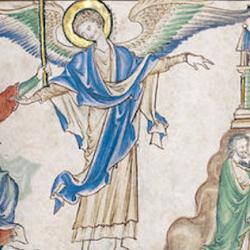“Mouth” (stoma) appears 22 times in Revelation. Mostly, things come out of mouths, rather than going in.
The book is framed by double references to the sword that comes from the mouth of Jesus (1:16; 2:16; 19:15, 21). Jesus’ mouth-sword is the ideal: A word that slays and sacrifices.
The horses of Revelation don’t have swords in their mouths, but they have the other feature of cherubic defense: They breath fire (9:17-19). The two witnesses are also fire-breathers (11:5).
“Mouth” is used 7x in Revelation 12-13, three times of the dragon’s mouth, which spews a river that threatens to drown the woman (12:15-16), four times of the sea beast who has a lion mouth that is given to blasphemy (13:2, 5-6). The seven “mouths” of these chapters are anti-creational. Later, the anti-Trinity of dragon, beast, and false prophet brings three unclean frog spirits out of their mouths (16:13).
Only once is stoma used in a context where something is going in: John eats the little book that the angel gives him, sweet as honey in his mouth (10:9-10). That puts the word of prophecy in his mouth, and places him among the saints whose mouths are filled with truth: “no lie was found in their mouth” (14:5).
Literally, this is all about words. Jesus’ word is a sword of war that slaughters His enemies; the fire-breathers speak out judgment, or sacrificial fire; the river from the dragon’s mouth is an engulfing tide of words; and the sea beasts’s lion-mouth is explicitly said to roar or blasphemies and great things. Being saved or not, it depends on what’s in the mouth, for ultimately every stray word will come into judgment.














